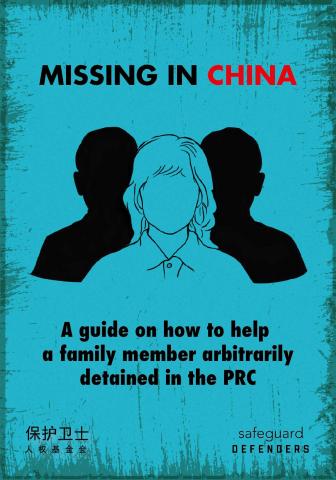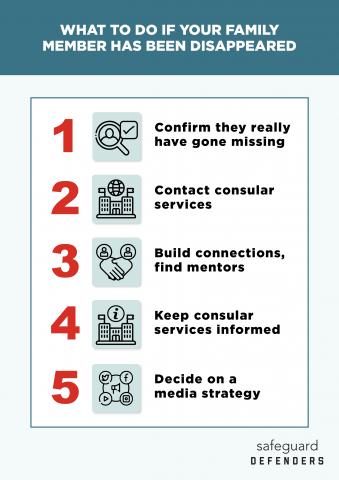Missing in China: New guide aims to help families of detained foreigners

Safeguard Defenders is releasing its new handbook ‘Missing in China’ today in response to the growing number of foreign citizens arbitrarily detained in the authoritarian country.
The handbook is a combination of the organization’s extensive research in China’s repressive judicial system and the first-hand experiences of former detainees and their families. It offers readers with crucial insights and practical advice to deal with the detention of a loved one in China and aims to help them become the best possible advocates for their family member.
‘Missing in China’ is available to download here in English, Chinese and Japanese.
It includes information on what to expect from China’s law enforcement and judicial processes, how to retain a lawyer, how your country and consular services can assist, ways to engage with media and other possible allies, as well as other practical information.

“The Missing in China handbook is a precious gem to guide anybody whose loved-one gets locked up in China. While contributing and watching the book emerge I often think of the helplessness of my son and only child who was just 18-years-old when I and his mum went 'missing' for two years in China in 2013-2015. If only he had access to this guidebook at that time! So long as China continues its habit of arbitrary and wrongful imprisonment, this will be a valuable toolbox to manage such ordeals.”
Peter Humphrey, Former prisoner in China, advocate to families of foreign prisoners in China, External Research Associate, Harvard University Fairbank Center for Chinese Studies
“Thank you for this impressive and urgently needed guide on how to assist families whose loved ones are missing or detained in China. The report is stunning. It's soberingly clear, comprehensive and unflinchingly realistic. I venture to say it will quickly become the blueprint for other such country guides. Matter of fact, I think it should.”
Susanne Berger, Raoul Wallenberg Centre for Human Rights, Canada
In 2024, China rolled out a unilateral visa-free travel policy for many Western countries. Intended for short-term tourist trips, Beijing’s message was clear: Gone are the COVID restrictions, come visit!
Conveniently left out was the very real and rising risk of arbitrary detention of foreigners in China, Beijing’s unapologetic use of hostage diplomacy and a myriad of violations in consular obligations. All within a system where torture and other inhuman or degrading treatment are rife, and minimal fair trial standards completely absent.
While the majority of detentions of foreigners in China go unreported, some of the names that have made the news since 2018 include American Jeff Harper (2020); Australians Yang Hengjun (2019 to present) and Cheng Lei (2020 to 2023); Briton Ian Stones (likely 2018 to 2024); Canadians Michael Kovrig and Michael Spavor (2018 to 2021); and Japanese Iwatani Nobu (2019).
In recent years, China has amended its counter-espionage and state secrets laws, markedly expanding both the scope of activities considered illegal and the ambiguity surrounding their interpretation. China has used these laws to target more than a dozen Japanese nationals and, for the first time last year, a South Korean worker in the country.
The authoritarian practice of using foreign citizens as bargaining chips in international relations became of such concern that Canada launched the Declaration Against Arbitrary Detention in State-to-State Relations on 15 February 2021. As of February 2025, 80 countries have signed on to the Declaration.
Yet, at the same time, those same nations often fail to provide adequate warnings to their citizens. While China was clearly on their minds when the Declaration against Arbitrary Detention in State-to-State Relations was drafted, most of the signatory country’s travel advisories do not reflect such a risk assessment.
A Safeguard Defenders’ review of 42 countries’ China travel advisories revealed serious omissions in offering accurate information on the risks of detention and the serious lack of rule of law in the country.
We scanned the main China travel advisories pages for all European Union and European Free Trade Area Member States, five English-speaking countries (Australia, Canada, New Zealand, UK and the US) and three East Asian nations (Japan, Korea and Taiwan) and found that:
Only five countries (none in Europe) mention the risk of arbitrary detention at all. Those five were Australia, Canada, Taiwan, the UK and US.
Not a single advisory mentioned the use of RSDL, China’s notorious system of enforced disappearances at an undisclosed location many of the foreigners in the above list were subjected to. Spain was the only country that mentioned “detention in isolation” but wrote the duration as 30 days, when it can be up to six months.
Only 7 advisories mention the lack of rule of law, even though China has no judicial independence, routinely restricts lawyer access, and has a near 100% conviction rate.
Despite the fact that China has recently tightened its laws on state secrets and espionage, and that these are regularly being used against foreigners, only 11 out of 42 countries mention these or national security risks on their travel advisories.
Just 14 advisories mention the danger to dual citizens, even though China rarely honors its consular obligations if the person also holds or used to hold a Chinese passport.
And, despite China’s rising use of exit bans on foreigners that has been widely reported by the world’s media (following our report Trapped that drew attention to this trend), under half, or just 17 countries mentioned this risk.
The lack of coherent and accurate information on the severe risks associated with travel to China is exacerbated by the lack of comprehensive public information on how to deal with the disappearance and/or detention of a relative in China.
When someone goes missing in China, the country’s secretive law enforcement and judicial system are especially difficult to navigate. This is a frightening situation for family members and friends back home who seek to assist their loved ones.
Safeguard Defenders' handbook Missing is specifically designed to fill this gap and to empower family members become the best advocates they can be for the detainee.
Download the English version of the handbook here.
Based on the experiences and insights shared by former victims, it aims to do this by explaining China’s law enforcement system and judicial process, outlining what consular services can and cannot do, how to retain a lawyer in China, and ways to engage with the media, while suggesting possible allies that can offer additional help and advice.
The handbook also contains basic information on consular services in case of detention in China including emergency hotlines for the following countries: Australia, Canada, Japan, New Zealand, South Korea, Taiwan, the United Kingdom, and United States.
In addition, Safeguard Defenders has compiled a European Directory, which contains similar information for EU and EFTA Member States. These are: Austria, Belgium, Bulgaria, Croatia, Cyprus, Czechia, Denmark, Estonia, Finland, France, Germany, Greece, Hungary, Iceland, Ireland, Italy, Latvia, Liechtenstein, Lithuania, Luxembourg, Malta, Netherlands, Norway, Poland, Portugal, Romania, Slovakia, Slovenia, Spain, Sweden and Switzerland.
We warmly recommend anyone traveling to China, and their designated contacts at home, to familiarize themselves with this handbook, which also contains practical advice on simple steps to take prior to your departure.
Chinese authorities may search your belongings and electronic devices at all times during your stay in the country. Do not carry this guide with you.


